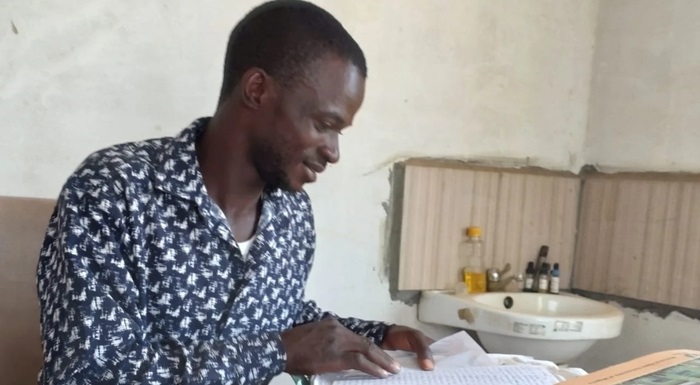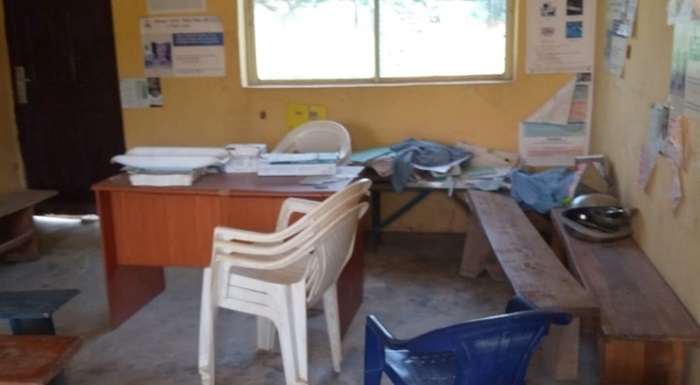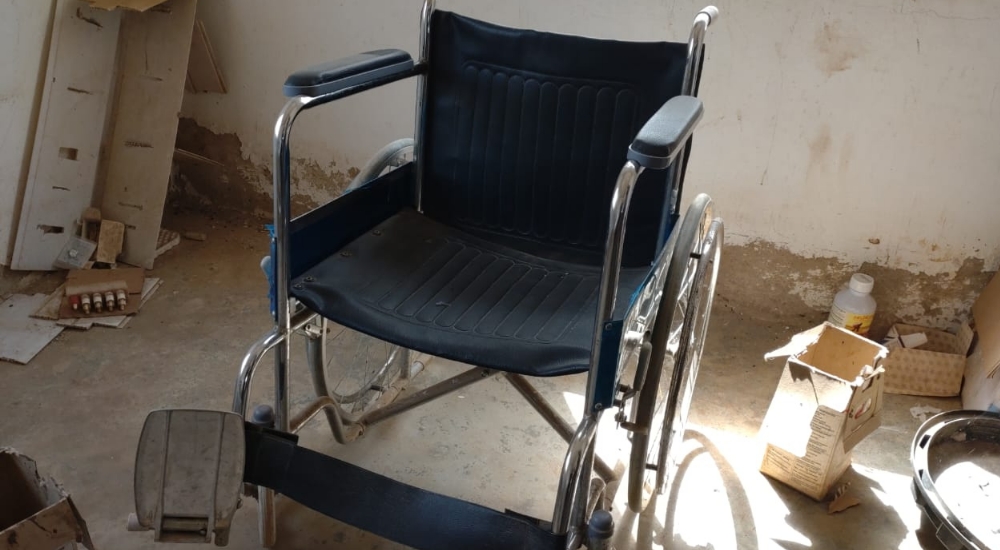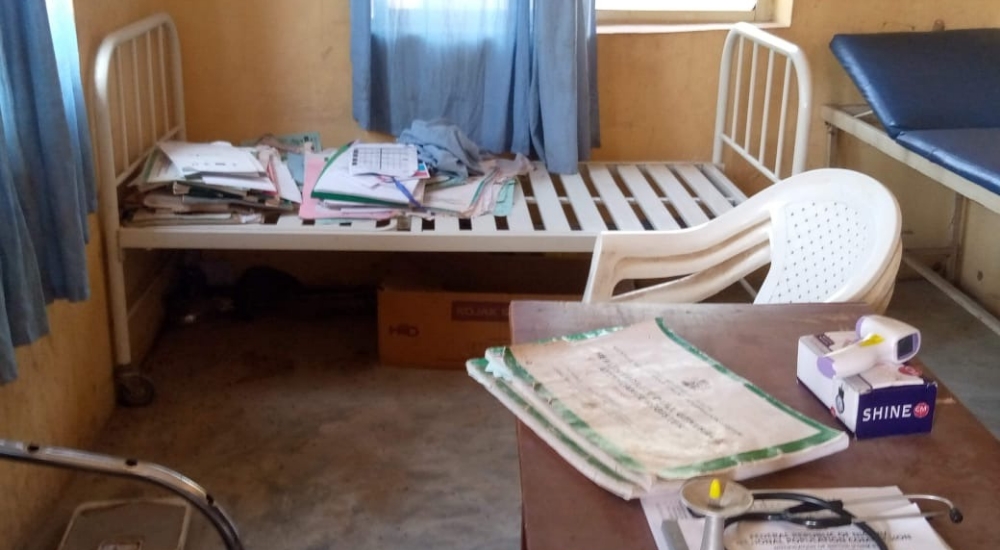It was just past midnight when Sam Yakubu’s phone rang, waking him up from a deep sleep. He wasn’t startled, though, as he has grown accustomed to midnight calls from families with medical emergencies.
The call was not different from the other calls he usually received: a woman in labour was waiting anxiously at the clinic for his arrival.
Yakubu, a volunteer at a World Bank-assisted Clinic in Dokuma Community, in Bwari Area Council of the Federal Capital Territory (FCT), has been catering to the health needs of the community ever since the clinic was established in 2019.

While the midnight calls from women in labour had become a normal thing for Yakubu, what happened that fateful night would become an experience he would never forget.
“When I arrived and checked the woman, I noticed that it was not yet time for her to give birth, so I told her to walk around the clinic. We were at it for three hours when I noticed it was time. I hurriedly put on my hand gloves and bent to gently pull out the baby and that was when I blacked out,” he narrated.
When Yakubu regained consciousness, he was lying on his bed at home with many members of his community wailing outside, thinking that he had given up the ghost.
While some members of the community have attributed the incident to an attack by an ‘evil spirit’, Yakubu thought otherwise.
He suspected he was exhausted from lack of sleep caused by the enormous task of catering to the health needs of over 1000 members of his community.
This harrowing incident of 2022, left Yakubu severely traumatized and rendered him incapacitated and unable to work for several days as he struggled to get back on his feet.
“I was scared after that. But I had to put myself together and continue again. For me, failure is not an option. I had to encourage myself and continue,” he said.
The graduate of Shehu Idris College of Health, Kaduna, stated that the burden of providing healthcare services for his community would have been significantly reduced if the government had adopted the clinic.
The clinic, a Community Social Development Program (CSDP), was established through a Community-Driven Development (CDD) Approach project, where the community contributed 10 percent of the project’s total cost.

Essentially, Yakubu believes that government involvement would have alleviated some of the financial and administrative pressures associated with running the clinic, allowing for more effective healthcare delivery to the community.
Yakubu uses his money to run the clinic, and with the current inflation and hike in prices of drugs, he barely has enough to live on as many of the residents cannot afford the drugs.
The plea for government adoption of the clinic is even more urgent now than ever before, Yakubu explained as he attends to not just his community but also seven other neighbouring communities, some of which fall under Kaduna State.
“In a single day, I can attend to up to five people or more,” he said.
While the pregnant women receive antenatal care by daytime at Kaduna, as the nearest Primary Health Care (PHC) Center in FCT is far from them, Yakubu steps in to provide critical support at the unholy hours of the night when help is very difficult to access, and this was despite the insecurity that held sway in such areas.
The struggle to offer healthcare services to his people has grounded the 27-year-old volunteer as he could not progress in his career or engage in other endeavours.
“Last year, I got admission to study Medical Laboratory Science at the University of Sokoto, but I couldn’t go because the chief and the people were crying, asking who would take care of their health needs when I leave. So I stayed back,” he narrated.
Yakubu is not alone in this struggle. Luka Peter, a volunteer in another World Bank-assisted clinic in Gawu, Kuje Area Council, also faces the same challenge.
According to him, many of the babies he helped deliver were at night.
“When labour starts, sometimes, I had to go to their houses because the pregnant women could not trek to the clinic,” he said.
The graduate of the College of Health Science and Technology, Lafia, Nasarawa State, worries that his people would die from the absence of healthcare services if he eventually leaves, and pleads that the government employs staff, including himself, for the clinic.
“If I leave, my people will suffer and they will be abandoned as no government will remember that there is a community called Gawu when it comes to immunization and distribution of drugs that are given for free.
“Pregnant women will suffer more because no one will offer them antenatal care,” the 28-year-old volunteer said.

The Project
The clinic is part of the FCT Community and Social Development Project, a World Bank-assisted project.
The FCT Community and Social Development Project started in 2008, and additional funding was provided in 2014; First Additional Financing and 2016; Second Additional Financing.
According to Shuaibu Adamu, General Manager of FCT/CSDP, during an interview in 2020, the project’s success “lies in its community-driven approach, which fosters a sense of ownership among community members.”
The project selected communities to be attended to based on recommendations from the FCT area councils and the communities’ commitment to the project.
Shuaibu noted that the FCT/CSDP had funded over 160 micro-projects, with the World Bank funding an additional 40 supplementary projects.
The projects include rural electrification, water provision, and the building of healthcare centers.

Communities’ Struggles
Though the project is tailored towards empowering community members to take ownership of projects, the communities where these clinics are situated, however, fear that without government presence, the clinics will at a point fail to exist.
The community members told THE WHISTLER that ever since the clinic was established, they have been calling on the government to take ownership of the health institutions to no avail.
Documents provided by Dokuma Community showed that the community contributed N988,094 from the N9,880,941 that was utilized in constructing the clinic and drilling a borehole in it.
David Yakubu, one of the Dokuma community members instrumental in the initiation of the project, explained how he had written severally to the Bwari area council administration to send their staff to the clinic or recruit volunteers from the community who were ready to work, but got no response from them.
David, who also provided THE WHISTLER with copies of the letters he had written, also stated that the community had escalated the matter and had written to the Federal Capital Territory Primary Health Care Board, yet the issues remained unattended.
“We have been crying and nobody is giving us a listening ear. When CSDP finished the work, they called the area council and handed over the project to them. They refused to come and take charge. The facility is saving lives. If the area council had added its voices to our cry, I am sure that the FCT Primary Health Care Board would have listened and taken ownership of the clinic,” he said.
He noted that the need for a clinic in the area became urgent due to the activities of kidnappers, adding that the people cannot travel long distances at night to seek medical services.
“There was a time when the FCT was agog with kidnapping, particularly in the Bwari axis. We recorded over 37 kidnap cases where over 200 people were kidnapped. Though none of them is presently in captivity, over 27 people were killed. The government has not paid attention to the people in this community. When you move around, you hardly feel government presence here,” David lamented.
Luka Elesha, from the Gawu Community, also shared the same feeling as David, stating that his community is tired of writing letters to the authorities to come to their aid.
Elesha, who however did not produce copies of the letters, stated that though the Kuje Area Council administration had assigned medical personnel to the clinic some years back, the personnel eventually stopped work in 2023, and all efforts made to get a replacement for him had proved abortive, making it extremely difficult for the lone health volunteer in the community to shoulder the burden of administering healthcare to the community.
Communities like Dokuma and Gawu are among many of the communities that are located far from the urban centers.
It took THE WHISTLER over an hour from Bwari Town, on a motorcycle, through an untarred bad and dusty road, to get to Dokuma Community. While the journey to Gawu from Kuje required a shorter bike ride, this reporter had to wade through a stream at some point, before getting to the community. The remote locations of the visited villages underscore the urgent need for functional clinics to serve the local population.
Area Council’s Nonchalant Attitude
THE WHISTLER reached out to the Bwari Area Supervisory Councillor for Health, Sabwaya Morris Atnadu, to ascertain why the council seemed to be ignoring the community’s pleas for help, despite the projects being situated based on the council’s recommendations.
Atnadu, after several phone calls, scheduled a meeting with THE WHISTLER and the chairman of the Area Council, Hon. John Gabaya. However, on getting to the area council, the councilor told this reporter that he was unable to reach the Chairman, claiming that the Chairman’s phones were switched off.
“I can’t say anything to you without the chairman’s approval and now his phone is off. I can’t reach him,” he said.
A Visit To FCT Primary Health Care Center Board
Armed with a letter addressed to the FCT Primary HealthCare Center Board and written by the Dokuma Community in 2020, THE WHISTLER visited the Board and was directed to the Head of the Planning Department of the board, Dr. Sebastian Esomonu.
He immediately requested for the letter written by the community and then went on to trace its location and status. From the mail department, Esomonu found out that it was sent to the Department of Monitoring.
He immediately put a phone call to someone from the department named Joy. Joy, after enquiring about the name of the community, the ward, and the area council, exclaimed that the Kawu ward in the council had been bedeviled by insecurity, adding that the Board’s services were halted due to insecurity.
They however blamed the community for not doing a follow-up after delivering the letters.
“We usually get such requests but it requires follow-ups. Since this letter came here, we have had like three executive chairmen. The department heads have also been changed,” Esomonu said.
He asked the communities to write reminder letters while attaching the ones they had written before and to also come for follow-ups.
Asked what benefit the clinics could get if the government got involved, Esomonu said, “The community can have access to “Seed drugs” which are essential medicines that are provided free of charge or at a subsidized rate to healthcare facilities, especially in rural or underserved areas. There are also intervention drugs from NGOs.”
This story was sponsored by the Civic Media Lab

